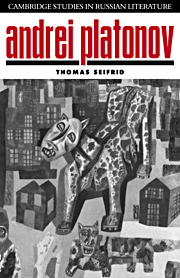Book contents
- Frontmatter
- Contents
- Preface
- List of abbreviations
- Introduction: The problem of reading Platonov
- 1 Consciousness and matter: Platonov in Voronezh and Tambov (1917–1926)
- 2 Learning the language of being (1926–1927)
- 3 Chevengur and the utopian genre
- 4 Platonov and the culture of the Five-Year Plan (1929–1931)
- 5 “Socialist Realist” Platonov (1934–1951)
- Conclusion
- Notes
- Select bibliography
- Index
- CAMBRIDGE STUDIES IN RUSSIAN LITERATURE
5 - “Socialist Realist” Platonov (1934–1951)
Published online by Cambridge University Press: 27 August 2009
- Frontmatter
- Contents
- Preface
- List of abbreviations
- Introduction: The problem of reading Platonov
- 1 Consciousness and matter: Platonov in Voronezh and Tambov (1917–1926)
- 2 Learning the language of being (1926–1927)
- 3 Chevengur and the utopian genre
- 4 Platonov and the culture of the Five-Year Plan (1929–1931)
- 5 “Socialist Realist” Platonov (1934–1951)
- Conclusion
- Notes
- Select bibliography
- Index
- CAMBRIDGE STUDIES IN RUSSIAN LITERATURE
Summary
My title is not meant to imply the full identity of its terms, but simply to address the theme of the works Platonov produced in the age of socialist realism's hegemony — which for him essentially meant everything written after “Vprok.” With some minor exceptions (“Iuvenil'noe more” and “Musornyi veter,” and his two plays of the mid 1930s) virtually everything Platonov completed from 1934–1951 was either published in or clearly intended for standard Soviet publication, for which the principles of socialist realism (however malleable from time to time, as Platonov himself shows) were obligatory. We know of no great, unconventional works in the manner of Chevengur and Kotlovan written for the “drawer” in this period, and the failure of any to surface during his by now virtually complete rehabilitation suggests none indeed exists.
That a discontinuity divides the pre- and post-1934 oeuvre is thus beyond dispute. What we have is two Platonovs, much in the way that one can speak of two (pre- and socialist realist-) Pasternaks or Zabolotskiis, though in Platonov's case there is a distinct irony to the fact that because the later, more “conformist” Platonov most readily lent himself to rehabilitation in the Brezhnev period, many readers came to view him as the representative article.
- Type
- Chapter
- Information
- Andrei PlatonovUncertainties of Spirit, pp. 176 - 198Publisher: Cambridge University PressPrint publication year: 1992

